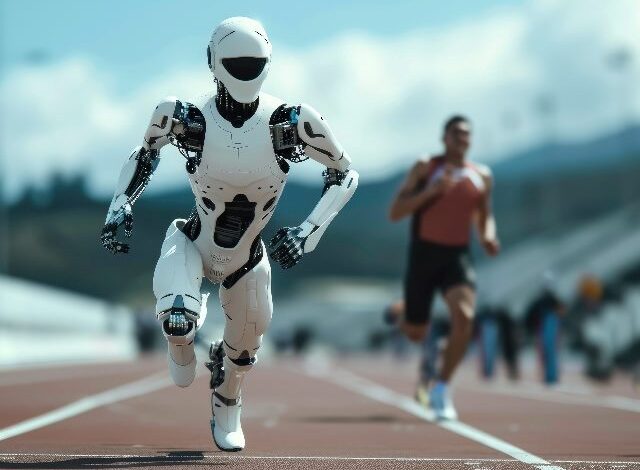AI and the Web Developer’s Future

The Gist
- Art meets science. AI enhances web development by automating tasks while preserving the need for human creativity.
- Enhance user experience. AI-driven insights lead to tailored web designs that increase user satisfaction and engagement.
- Speed up innovation. AI tools enable rapid prototyping and testing, accelerating the web development cycle.
As artificial intelligence (AI) continues to reshape industries across the globe, the field of web development stands at a crossroads. AI technologies, with their ability to automate complex tasks and analyze massive datasets, are making significant inroads into areas traditionally dominated by human developers. From automating routine coding tasks to revolutionizing user experience design, AI is not just altering how websites are developed, but is also redefining the skills required of web developers.
This integration of AI into web development raises a crucial question: Can traditional web development survive in the face of these rapid technological advancements? This article explores the evolving and rapidly transitioning world of web development as it intersects with the innovative capabilities of AI.
Impact of AI on Web Development
The advent of AI in web development signals the beginning of yet another transformative era, streamlining processes that once required extensive manual effort and deep technical knowledge. AI’s impact on the field is profound and multifaceted, affecting everything from how web pages are built to how users interact.
Sara Faatz, director of technology community relations at software development company Progress, told CMSWire that development is both an art and a science. “While some of the mundane and repetitive development tasks can be automated through the help of AI, there will always be a need for human intervention — this is the art,” said Faatz. “From a CMS-specific perspective, AI-enhanced page creation and editing, content tagging, and customer segmentation are all very real features that exist today. This enables marketers and business users of a CMS to have less reliance on IT for general use cases and daily tasks.”
One of the primary benefits of AI in web development is its ability to automate routine tasks. AI-powered tools, such as code assistants, can handle standard coding functionalities, optimize performance, and conduct comprehensive testing for bugs. This automation significantly reduces the time developers spend on repetitive tasks, freeing them up to focus on the more complex and creative aspects of web development.
In addition, AI’s capability to analyze vast amounts of user data and behavior is revolutionizing user experience (UX) design. By leveraging machine learning (ML) algorithms, AI can unearth insights that lead to more effective and engaging web designs. This includes creating personalized content tailored to individual users, optimizing navigation layouts for better usability and designing adaptive interfaces that dynamically respond to user preferences and behaviors in real-time. Such AI-driven customizations enhance the user’s interaction with a website, potentially boosting satisfaction and engagement.
AI-driven low- and no-code development facilitates the rapid prototyping of web pages and applications. Developers can input specific design parameters into AI tools, which then automatically generate the underlying code for the desired features. This capability not only accelerates the development process but also enhances flexibility, allowing for greater experimentation and iteration. It enables developers to quickly test and refine various design concepts, which is crucial in today’s fast-paced market environments.
Peter McKee, head of developer relations at Sonar, a code quality assurance platform, believes that AI will definitely impact web development. “Most applications that are built today are built for workflow automation at companies. These applications could benefit greatly from AI-generated code because most of the code that is written is boilerplate code.” McKee said that AI brings a tremendous opportunity to the software space as demands on developers mount. “For one, it has the incredible ability to churn out code at a speed that far outpaces humans. AI can complete tedious work in a matter of seconds that would otherwise take valuable time out of a developer’s day,” said McKee. “It can not only move a project forward at a faster rate, but its quick-coding capabilities can also give developers a jump start on their projects and help them figure out where to begin.”
The integration of AI into web development is not just about increasing efficiency; it’s about fundamentally improving the way websites are designed, built and experienced by users. As these technologies continue to evolve, they promise to further empower developers and designers, paving the way for more innovative and user-centric web solutions.
Phil Strazzulla, founder of Select Software Reviews, an HR and recruiting software review website, told CMSWire that the introduction of AI-powered analytics in user experience design has significantly altered how they approach website layouts and user interactions. “We created an AI system that analyzes user activity trends and suggests layout changes,” said Strazzulla. “For example, using AI data, we discovered that reordering key components on a landing page enhanced conversion rates by 15%.” Strazzulla said that this solution enabled his team to continually optimize their websites based on user interaction data, which traditional analytics systems may not capture as quickly or efficiently.
Related Article: Will AI Chatbots Make Coders Obsolete?
Survival of Traditional Web Development
The narrative surrounding the survival of traditional web development in the age of AI is not one of extinction but rather, evolution. As AI continues to reshape web development, it brings with it a host of opportunities for developers to adapt and thrive in new roles that blend traditional skills with cutting-edge technologies.
Earlier technologies that impacted web development include WYSIWYG editors and Content Management Systems (CMS), both of which eliminated the requirement to understand HTML, CSS, JavaScript and other web technologies. Traditional web development is likely to undergo similar transformations rather than become obsolete. By learning to coexist with AI, leveraging its strengths to enhance their own work, and focusing on areas that inherently require human insight, web developers can ensure their skills remain relevant and in demand in an AI-integrated future.
That doesn’t mean that the knowledge and understanding of traditional web development technologies won’t remain valuable. McKee said that all technology, when done well, moves us up the abstraction layer. “Meaning it will become simpler to build applications — but it will not remove the need to understand web development all at once.”
Despite the extensive capabilities of AI, certain elements of web development will continue to require the human touch. Creative and strategic thinking, understanding nuanced user needs, and delivering custom solutions are areas where human developers excel. AI can support these tasks by providing data-driven insights and automating routine parts of the process, but the final vision and execution are still likely to depend on human judgment and creativity.
Fabricio Inocencio, head of education and AI at Digibee, an integration platform-as-a-service provider, told CMSWire that AI has significantly enhanced various aspects of web development. “Code companions assist developers in utilizing rich frameworks like JavaScript libraries, making routine coding tasks, debugging, and testing more efficient,” said Inocencio. “For citizen developers (non-tech professionals), the fusion of low-code platforms and AI simplifies the development of straightforward projects.” Inocencio suggested that despite these advancements, core programming skills, especially in languages like JavaScript, remain crucial for complex projects.
In addition, the human ability to empathize with user experiences and iterate on design based on subtle feedback is something AI has yet to fully replicate. This sensitivity to user-centric design is crucial in creating websites that are not only functional but also engaging and intuitive.
“Current low-code and AI solutions are insufficient for developing highly customizable and intricate applications, necessitating traditional coding expertise,” said Inocencio. “Additionally, the creative and strategic aspects of web development, which rely on human intuition and creativity, are largely unaffected by AI. Human oversight is essential to ensure that AI tools align with the overall vision and goals of a project.”
Related Article: As AI Gets Better, Could It Swallow the Companies Building With It?
AI-Driven Low- and No-Code Web Development?
AI-driven low-code and no-code development platforms play a transformative role in web development by democratizing the creation and management of websites and applications. These platforms are designed to reduce the need for extensive coding knowledge, enabling users with minimal technical expertise to build, customize, and deploy web solutions.
Low-code and no-code platforms make web development accessible to a broader audience, including business professionals, entrepreneurs and non-technical individuals. By providing intuitive drag-and-drop interfaces and pre-built templates, these platforms allow users to create functional websites and apps without needing to write code. This opens up web development to a wider group of people, fostering innovation and allowing businesses to respond more quickly to market needs.
“Many developers have embraced low- and no-code development tools,” said McKee. “Low-code development tools allow developers to create software applications quickly and easily by providing an intuitive drag-and-drop interface for creating application components and this helps streamline the development process. Developers who have embraced low- and no-code development tools are also likely to embrace the benefits of AI since it can greatly enhance efficiency.”
These platforms significantly speed up the development process. Traditional coding can be time-consuming, involving detailed debugging and testing. Low-code and no-code solutions automate much of this process, allowing for the rapid prototyping and deployment of applications. This efficiency is crucial for businesses looking to quickly adapt to changes in the market or customer preferences.
Additionally, AI-driven programming tools are changing the way that programmers approach app development. These tools exemplify how AI enhances software development and design. GitHub Copilot acts as an intelligent pair programmer, suggesting code in real-time, while Uizard transforms hand-drawn sketches into digital UI designs, making prototyping accessible to non-designers. Hugging Face offers a platform for implementing advanced NLP capabilities with its extensive library of pre-trained models. Like low- and no-code solutions, these tools streamline coding, design, and NLP tasks, democratizing access to sophisticated technologies and boosting productivity across development teams.
Related Article: Generative AI in Technology: Unleashing Higher Productivity
Challenges for Traditional Web Development
As AI becomes more deeply integrated into web development, it presents a series of challenges that could reshape many aspects of the field. These challenges not only test the adaptability of developers but also raise broader concerns about the future of the profession.
The advent of AI in web development is causing a notable shift in the required skill set. As AI increasingly automates routine coding tasks, developers are transitioning from primarily manual coding to managing and optimizing AI tools. This shift necessitates a new skill set, including a deeper understanding of AI technologies and data management.
Ian Sells, CEO of ecommerce entrepreneur community Million Dollar Sellers, told CMSWire that one major challenge is keeping his team’s abilities relevant and up to date. “Adopting AI tools necessitates a change in skill focus. We originally struggled with AI integration since it was difficult to strike a balance between using AI to increase efficiency and keeping our team’s expertise in core development capabilities. To address this, we created frequent training sessions and workshops to maintain our team proficient in both traditional and AI-driven methodologies. This dual-focus approach has kept our workflow seamless and innovative, allowing us to stay on the cutting edge of web development technologies.”
Similarly, Inocencio suggested that new AI tools, frameworks, and solutions are introduced weekly, creating complexity in determining what is worth studying. “This accelerated pace can cause hesitation among professionals, who may wait for stability before deciding what to focus on.” Inocencio said that the current lack of curation and vetting of AI solutions adds to this uncertainty, as users prefer vetted solutions to ensure their time investment is worthwhile. “Traditional coding frameworks for web development in JS, such as React and Node.js, are stable and reliable. While there are promising AI and low-code solutions available, there is often more fear than enthusiasm for exploring these new tools.”
Developers must also oversee the integration of AI into their workflows, which demands continuous learning and adaptation to keep up with technological advances. While the automation capabilities of AI raise concerns about job displacement, with routine coding roles potentially becoming obsolete, they also create opportunities for developers to take on advanced roles that combine human creativity with AI. These new roles focus on areas requiring strategic oversight, creative input, and complex problem-solving, underscoring the irreplaceable value of human creativity, intuition and innovation.
Despite the benefits of AI, debates persist about its ability to match the quality and creativity of human developers, especially in projects needing bespoke solutions or high innovation levels. AI operates within the constraints of its programming and data inputs, which may limit its ability to replicate the nuanced decision-making and creative problem-solving that human developers bring to the table. This raises questions about AI’s role in projects where a unique, creative vision is essential for success. There are also concerns about AI-generated code quality.
McKee, well-versed in assessing AI-produced code quality, told CMSWire that AI is capable of generating low-quality code if trained on poor-quality data. “One of the limitations and risk considerations when it comes to AI-generating code is the quality of code that it produces. AI pulls from what it’s taught (i.e. past data, natural language processing, machine learning), but this data might not have been reviewed for quality and therefore could introduce defects or poor patterns of code. This could also increase the likelihood that the code will be difficult and costly to maintain.”
Conversely, Strazzulla told CMSWire that rather than create poor code, AI itself is capable of reducing errors in code. “AI’s incorporation into automatic error detection has been game-changing,” explained Strazzulla. “In one of our projects, we used an AI tool that detects and recommends solutions for coding problems in real-time. This method not only cut our debugging time by 40%, but it also helped junior devs learn faster by demonstrating typical mistakes and how to fix them.” Strazzulla said this practical application of AI ensures that his staff remains efficient and that his company’s goods meet high-quality standards.
Final Thoughts
The integration of AI into web development represents a pivotal shift in how websites and applications are created and experienced. Traditional web development skills must evolve to coexist with AI, focusing on strategic planning, creative vision and mastering these innovative new tools. By balancing AI’s capabilities with uniquely human talents like empathy and ingenuity, web development can advance into an era of unprecedented innovation, combining machine intelligence with human creativity.



